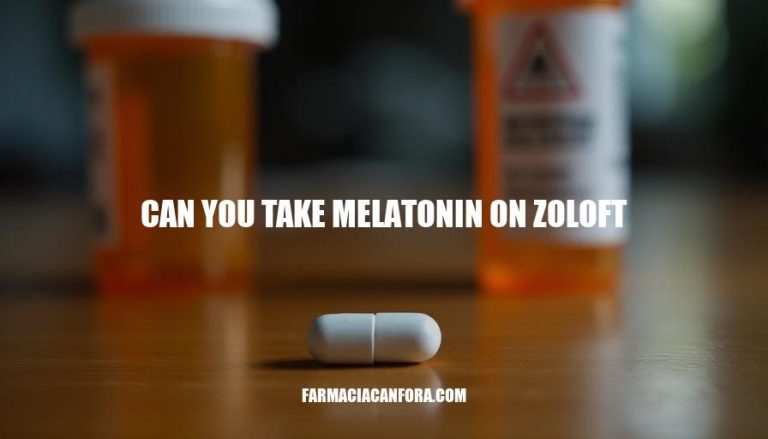


Melatonin is a supplement that helps with sleep. Zoloft is an antidepressant used to treat depression and anxiety. Some people on Zoloft have trouble sleeping, so they might think about taking melatonin too.
But it’s really important to understand how these two things interact with each other, so you can get the help you need without messing up your treatment.
Zoloft, also known by its generic name sertraline, is an antidepressant medication that belongs to a group of drugs called selective serotonin reuptake inhibitors (SSRIs). It is primarily used to treat various mental health conditions such as depression, obsessive-compulsive disorder (OCD), panic disorder, social anxiety disorder (SAD), post-traumatic stress disorder (PTSD), and premenstrual dysphoric disorder (PMDD).
Zoloft works by increasing the levels of serotonin in the brain. Serotonin is a neurotransmitter that helps regulate mood, emotions, and behavior.
By preventing the reuptake of serotonin, Zoloft helps maintain higher levels of this neurotransmitter in the brain, which can improve mood and reduce anxiety.
Common side effects of Zoloft include nausea, diarrhea, loss of appetite, sweating, shaking, and sexual side effects such as decreased libido and difficulty achieving orgasm. Some people may also experience insomnia or drowsiness, and it is important to discuss any side effects with a healthcare provider.
Regarding the use of melatonin with Zoloft, it is generally safe to take melatonin for sleep while on Zoloft, but it is always best to consult with a healthcare provider before starting any new medication or supplement to ensure there are no potential interactions or contraindications.
Melatonin is a hormone produced naturally by the pineal gland in the brain. It plays a crucial role in regulating the body’s circadian rhythm, which is essentially your sleep-wake cycle. Melatonin production is influenced by light exposure; it increases in the evening when it gets dark, helping you feel sleepy, and decreases in the morning when it gets light, helping you wake up.
As a supplement, melatonin is commonly used to treat sleep disorders such as insomnia and jet lag.
It’s available over-the-counter in various forms, including tablets and capsules. While generally considered safe for short-term use, melatonin can cause side effects like headaches, dizziness, and daytime drowsiness.
Regarding the combination of melatonin and Zoloft (sertraline), it’s important to exercise caution. Zoloft is a selective serotonin reuptake inhibitor (SSRI) used to treat depression and anxiety disorders.
Taking melatonin with Zoloft may increase the risk of side effects such as dizziness, drowsiness, and confusion. It’s advisable to consult a healthcare provider before combining these two substances to ensure safety and proper dosing.
Using melatonin and Zoloft (sertraline) together can increase side effects such as dizziness, drowsiness, confusion, and difficulty concentrating. Some people, especially the elderly, may also experience impairment in thinking, judgment, and motor coordination. It is important to avoid or limit the use of alcohol while being treated with these medications.
Medical professionals recommend talking to your doctor before using these medications together.
They can provide personalized advice based on your specific health situation and help you weigh the potential risks and benefits.
Consulting with a healthcare provider before combining melatonin with Zoloft is crucial. The interaction between these two substances can lead to increased side effects such as dizziness, drowsiness, confusion, and difficulty concentrating. Some individuals, especially the elderly, may experience impairment in thinking, judgment, and motor coordination.
It’s essential to seek professional advice to ensure personalized care and avoid potential risks.
Always inform your doctor about all medications you are taking, including over-the-counter supplements like melatonin, to receive the best guidance tailored to your specific health needs.
When considering taking melatonin while on Zoloft, it’s crucial to understand how these two substances interact with each other. Melatonin is a supplement that helps with sleep, while Zoloft is an antidepressant used to treat depression and anxiety.
While generally safe to take melatonin for sleep while on Zoloft, it’s always best to consult with a healthcare provider before starting any new medication or supplement. This is because taking melatonin with Zoloft may increase the risk of side effects such as dizziness, drowsiness, confusion, and difficulty concentrating.
It’s essential to seek professional advice to ensure personalized care and avoid potential risks. Always inform your doctor about all medications you are taking, including over-the-counter supplements like melatonin, to receive the best guidance tailored to your specific health needs.